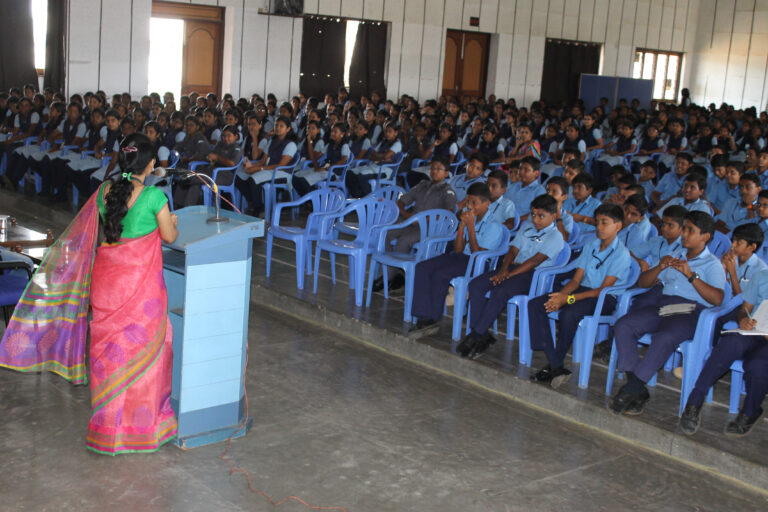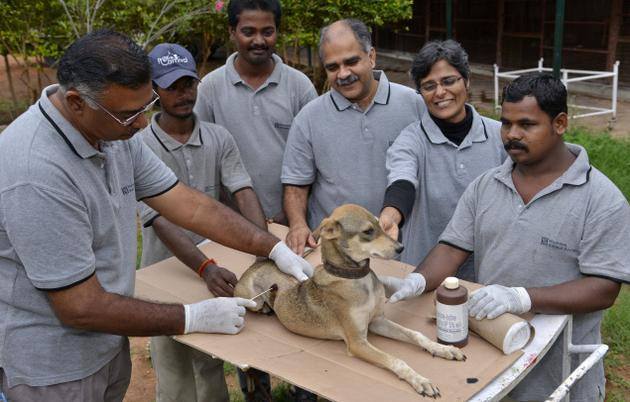
Partner Spotlight | Humane Animal Society (HAS)
Dr. Mini Vasudevan
Founder | Humane Animal Society, Coimbatore
Interviewed by: Nidhi Gupta
In this interview, Dr Mini Vasudevan, Founder of Humane Animal Society (HAS) in Coimbatore, shares her journey toward animal welfare. Since the time she witnessed animal suffering, she has dedicated her life to advocating for animal rights. Dr Vasudevan discusses HAS’s core values and emphasises on equality of all animals, and the need to challenge speciesism.
She also highlights key initiatives such as educational programmes, sterilisation and vaccination efforts to control animal populations, and the operation of an animal sanctuary. Dr Vasudevan also addresses challenges like funding shortages and the need for veterinary system reforms.

With a focus on rescue operations, Animal Birth Control (ABC), vaccinations, educational outreach, and cruelty response, HAS strives to create a compassionate society. This interview underscores the impactful work of HAS and the critical role of animal protection organisations in India.
Nidhi: Before we begin, let’s go back and recall that moment or a memory when you learnt that animals deserve kindness and respect, that they feel pain. We believe that journey is your inspiration today.
Dr Vasudevan: At the age of 11, I had a profound moment that forever changed my perspective on animals and their welfare. I witnessed the slaughter of a chicken and watched in horror as it struggled agonisingly and succumbed to pain. This experience shook me. I understood that animals were sentient beings, capable of feeling pain and suffering, and just like that, my life changed irrevocably. That day, I made the decision to become a vegetarian, choosing to abstain from consuming meat. And, I have stuck to my decision since then.
However, it wasn’t until many years later, during my time in Coimbatore, that I was confronted with the harsh reality of animals’ suffering in my community. I was disheartened to see that there were no organised efforts or resources dedicated to addressing the plight of community animals in the city. It was then that I felt a strong calling to take action and make a difference. What started as bringing like-minded individuals together and consolidating relevant resources, eventually culminated in creating a unified platform for animal welfare – the Humane Animal Society.

My journey is fuelled by the belief that every animal deserves kindness, respect, and protection. Through concerted efforts and collective action, we can create a brighter future for all sentient beings and ensure that they receive the care and compassion they so rightfully deserve.
Nidhi: How has your personal journey influenced your approach to leading the organisation today? Are there any specific values or principles that guide your work and decision-making as the founder?
Dr Vasudevan: At the core of my beliefs is the fundamental value that all lives are equal and deserving of respect and compassion. I firmly reject the notion that some lives are more important than others based on species distinctions. Throughout my journey, I have come to recognise and appreciate the sentience of all living creatures. This realisation has led me to adopt a stance against any form of discrimination among species. I firmly believe that it is hypocritical to profess love and compassion for certain animals while simultaneously participating in the exploitation and mistreatment of others. For instance, I cannot justify loving dogs while accepting the slaughter of chickens for food.
My perspective on animal welfare has evolved beyond societal conditioning and cultural norms. I am committed to challenging and dismantling the ingrained biases that perpetuate speciesism. It is this belief in the equality of all life forms that serves as a guiding principle in my work and decision-making as the Founder of HAS.
I would never accept that animals were meant for humans’ use. Instead, I strive to uphold ethical and moral principles that prioritise the well-being and dignity of all sentient beings. This fundamental ethos shapes the foundation of our organisation and informs every decision we make.
Nidhi: As the founder, could you describe some of the key initiatives or projects/programmes that you’ve led at HAS? Our readers would love to learn about the impact these initiatives had on promoting animal rights.
Dr Vasudevan: As the Founder of HAS, one of the key initiatives that I have led is focused on education and awareness surrounding animal rights. This initiative holds significant importance as it has the power to create a ripple effect unlike any other effort. When we rescue an animal, we only help the animal. When we create awareness about rescuing animals in need, we save many animals. By educating individuals and raising awareness, we aim to change attitudes and mindsets towards animals at large.
From the very early stages of our organisation, education and advocacy have been strong pillars of our work. We believe in empowering individuals to become advocates for animal rights and welfare in their own communities. When individuals approach us with a problem or concern, we not only provide solutions but also educate and involve them in the process. For example, if someone reaches out to us about a litter of puppies in need of assistance, we go beyond simply rescuing and rehoming them. Instead, we empower the individual by teaching them about fostering and other aspects of animal care. This approach not only addresses immediate needs but also fosters a sense of ownership and responsibility towards animal welfare. Ultimately, our goal is to create long-lasting change that benefits both animals and humans alike.
Nidhi: This is really interesting. When you say that it’s crucial for community animals to be sterilised and vaccinated, can you elaborate how it impacts our ecosystem and other key factors that are crucial for the public to know?
Dr Vasudevan: Firstly, sterilisation helps control the population of community animals, such as community dogs and cats. By reducing the number of uncontrolled breeding, we can mitigate issues related to overpopulation, such as competition for resources, spread of diseases, and conflicts with humans. This, in turn, helps maintain a healthier balance within the ecosystem and prevents the suffering of animals due to overcrowding and lack of resources.

Moreover, vaccinating community animals is essential for preventing the spread of infectious diseases, some of which can be transmitted to humans (zoonotic diseases). Diseases like rabies pose significant risks to both animal and human populations and other viral diseases like parvo and distemper spread quickly among vulnerable animals on the street. Vaccination not only protects individual animals from these diseases but also creates a barrier of immunity within the community, reducing the likelihood of outbreaks and safeguarding public health.
Furthermore, controlling the population of community animals through sterilisation and vaccination programmes can have economic benefits. By reducing the incidence of diseases and injuries caused by overpopulation, we can alleviate the burden on healthcare systems and decrease expenditures associated with treating animal-related injuries and diseases. Overall, sterilising and vaccinating community animals play a crucial role in promoting public health, preventing the spread of diseases, maintaining ecological balance, and reducing human-animal conflicts. These initiatives are essential components of responsible animal management for any animal welfare NGO.
Nidhi: HAS’s animal sanctuary that is set in a 1.5 acres of land at Vazhukkupparai, and is known for its peaceful and calm environment. It would be interesting for our readers to know how the sanctuary operates, about the animals that are staying as residents and the efforts that your team puts in for their medical and behavioural care?
Dr Vasudevan: The sanctuary at HAS serves as a safe haven for animals in need. The concept of the sanctuary arose from the necessity to provide a refuge for animals that had nowhere else to go. Many of these animals were rescued from dire situations, such as abuse, neglect, or injury, and needed a place where they could heal and thrive in peace.
At the sanctuary, animals are given the opportunity to live life on their own terms, free from the hardships they once faced. Our dedicated team ensures that each resident receives the care and attention they need to live happily and comfortably. This includes providing medical treatment for injuries or illnesses, as well as addressing any behavioural issues that may arise. The sanctuary is home to a diverse range of animals, including dogs, cats, cows, and a horse.

Each animal has their own unique story and personality, and our team works tirelessly to meet their individual needs. Whether it’s administering medication, providing enrichment activities, or simply offering our love and presence, we strive to create a nurturing environment where every animal can thrive. At the sanctuary, we demonstrate each day that even animals who have experienced trauma or hardship are capable of leading fulfilling lives when given the proper care and support. It’s a testament to the resilience of these animals and the transformative power of compassion.
Nidhi: How many cases do you receive in a month? What is the process and what kind of challenges/ cases do you address as an organisation for the animals?
Dr Vasudevan: On average, we receive a minimum of 50 calls per day, totalling approximately 2000 calls in a month, on an average. These calls range from abuse, neglect, complaints, and minor to major cases, requiring us to assess each situation based on its severity. Among the cases we address, road traffic accidents (RTAs) are increasingly common, posing significant challenges in terms of time, resources, and success rates. Sometimes, despite our best efforts, these animals succumb to their injury.
One of the primary challenges we face as an organisation is securing funds to support our operations. Unfortunately, animal welfare is often overlooked in government initiatives, making it difficult to obtain the necessary financial resources.
Additionally, there is a need to revamp the veterinary system to recognise and prioritise the intrinsic value of animals. Currently, veterinary education often emphasises exploitation rather than the well-being and rights of animals, perpetuating the problem.
Nidhi: Lastly, what are the key areas that you are currently focusing on? It would be helpful to understand the overarching goals of HAS as an organisation for the welfare of animals.

Dr Vasudevan:
- Rescue and Treatment Operations: Our primary goal is to rescue animals in distress, provide them with immediate first aid and medical treatment, perform surgeries if required, give them post-operative care, rehabilitate them, and ultimately find suitable adoptive homes for them.
- Animal Birth Control (ABC): We conduct mass sterilisation programmes to control the population of community animals. By sterilising these animals, we aim to reduce the number of unwanted litters and prevent the suffering associated with overpopulation.
- Mass Vaccinations: We organise mass vaccination campaigns to protect animals from preventable diseases. Vaccinations are essential for safeguarding the health and well-being of animals and preventing the spread of contagious illnesses.
- Educational Awareness Programmes: We actively engage in educational outreach programmes aimed at raising awareness about animal welfare issues in schools, colleges, and residential communities. These programmes aim to foster compassion towards animals, promote responsible pet ownership, and encourage community involvement in animal welfare initiatives.
- Cruelty Response: We respond to complaints of animal abuse, neglect, and violence by investigating reported incidents, filing reports with the police, and initiating legal proceedings when necessary. Our goal is to hold perpetrators accountable for their actions and advocate for the rights and protection of animals.
